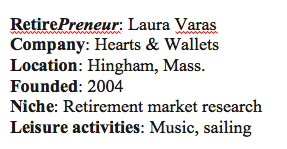
RetirePreneur: Laura Varas
'To me, retirement is the most interesting area of finance because it’s about how we live our lives,' says Hearts & Wallets consultant Laura Varas. 'We should give people the freedom to plan, and then give them guidelines that make it safe for them.'


